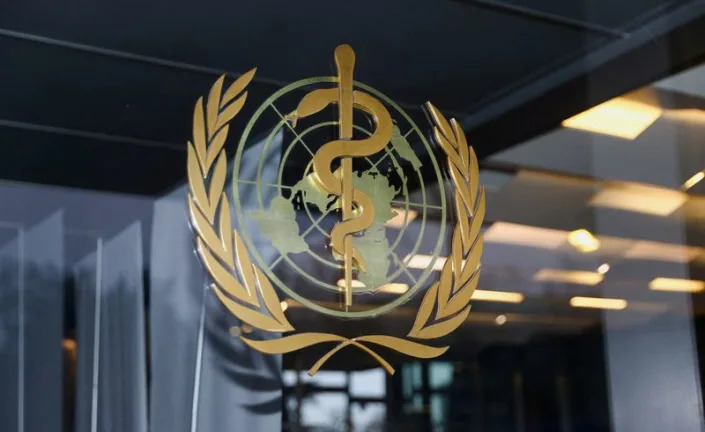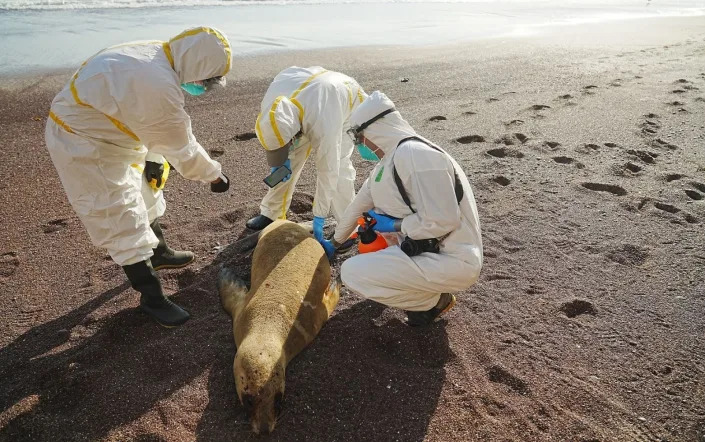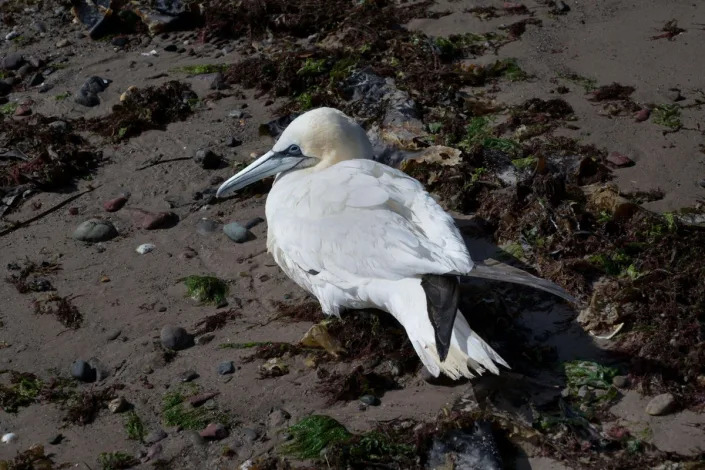
Mon, February 20, 2023
By Natalie Grover
LONDON (Reuters) - Governments should invest in vaccines for all strains of influenza virus that exist in the animal kingdom as an insurance policy in case of an outbreak in humans, the incoming chief scientist at the World Health Organization said on Monday.
Countries ranging from the United States and Britain to France and Japan have suffered record losses of poultry in outbreaks of avian flu in the past year.
The recent spread to mammals of H5N1 - commonly known as bird flu – needed to be monitored, but the risk to humans remained low, the WHO said earlier this month.
Incoming WHO chief scientist Jeremy Farrar said he would like to see the pharmaceutical industry at least conduct some clinical trials for all influenza strains such that the world would not have to start from scratch to initiate global manufacturing should the need arise.
"My concern that we're in slow motion watching something which may never happen," he added in a media briefing. "But if it were to happen, would we look back on what we're doing at the moment and say, why didn't we do more?"
Farrar is a clinical scientist who most recently served as the director of the Wellcome Trust. He was appointed as the WHO's chief scientist in December, and will formally join the agency later this year.
(Reporting by Natalie Grover in London; Editing by Alex Richardson)
Prepare bird flu vaccines now before virus jumps to humans, top scientist warns
Paul Nuki
Mon, February 20, 2023

Experts examine a dead sea lion on a beach in Peru, suspected to have died from bird flu - Serfor Per/EPA-EFE/Shutterstock
Governments across the world should urgently organise vaccines and other countermeasures to combat bird flu lest the disease which recently jumped to mammals starts to spread in humans, according to one of the world’s leading scientists.
Sir Jeremy Farrar, a former member of Sage and Chief Scientist designate of the Word Health Organization, said the avian H5N1 virus which is sweeping global bird populations posed the biggest current pandemic threat to the world after Covid.
The recent jump of the virus from birds to mammals, including mink, foxes, otters and sea lions here in Britain and around the world, should be regarded as a claxon call for government action, he added.
“If there was an outbreak in Europe, the Middle East, America or Mexico tomorrow of H5N1 in humans, we wouldn't be able to vaccinate the world within 2023,” said Sir Jeremy at a press briefing in London.
“So what I would like to see [is]... governments invest in having vaccines for every strain of influenza that exists in the animal kingdom through at least phase one and phase two [clinical trials].”
Sir Jeremy said the investment required to make such vaccines would not be wasted even if the current bird flu pandemic did not jump to humans.
“If there were an H5N1 outbreak [in humans] we would at least know that we had vaccines available, which were safe and effective. And if it doesn't happen, you haven't lost, because you’ve still got those [vaccines].”
Sir Jeremy added that a failure to act now, not just in creating new vaccines but in lowering the risk of the virus jumping to humans by improving biosecurity in farms and markets, could be seen in hindsight as a tragic omission.
“Imagine, tomorrow morning at nine o'clock there’s a report that there’s 100 people admitted to a hospital somewhere with a nasty respiratory virus, and it happens to be H5N1,” he said.
“That’s my concern; that we’re in slow motion watching something which may never happen but if it were to happen, would we look back and say, ‘Why didn’t we do more?’”
Genetic mutations
H5N1 was first reported in the Far East almost 20 years ago and has spread to become common in farmed poultry and wild birds around the world.
Although it does not yet spread efficiently between people, there have been 868 confirmed human cases and 457 deaths due to avian influenza cases reported to the World Health Organisation from 21 countries since 2003.
The fatality rate in humans is estimated to be around 50 per cent, although this varies by country and the exact strain of the virus observed.
What is worrying scientists now is that the virus has spread to affect many more types of bird and mammals.
Further, scientists have observed genetic mutations in the virus which they say may carry “public health implications”.
Sir Jeremy said the progress of H5N1 in the last few years could be characterised as a terrible natural experiment.
“If you wanted … to create something nasty, you would take a nonhuman influenza virus, you'd let it spread around the world amongst poultry, wild birds, etc,” he said.
“You would let those wild birds and poultry mix with mammals … and then you'd gradually let it go into minx and then maybe foxes and then maybe seals … and maybe dogs and cats.
“And then you'd see a small cluster of human cases somewhere having acquired the evolutionary advantage of mammalian to mammalian transmission.
“And you do that at a global scale, so there’s a shedload of viruses circulating.
“That's what we're doing.”
Protect yourself and your family by learning more about Global Health Security
Paul Nuki
Mon, February 20, 2023

Experts examine a dead sea lion on a beach in Peru, suspected to have died from bird flu - Serfor Per/EPA-EFE/Shutterstock
Governments across the world should urgently organise vaccines and other countermeasures to combat bird flu lest the disease which recently jumped to mammals starts to spread in humans, according to one of the world’s leading scientists.
Sir Jeremy Farrar, a former member of Sage and Chief Scientist designate of the Word Health Organization, said the avian H5N1 virus which is sweeping global bird populations posed the biggest current pandemic threat to the world after Covid.
The recent jump of the virus from birds to mammals, including mink, foxes, otters and sea lions here in Britain and around the world, should be regarded as a claxon call for government action, he added.
“If there was an outbreak in Europe, the Middle East, America or Mexico tomorrow of H5N1 in humans, we wouldn't be able to vaccinate the world within 2023,” said Sir Jeremy at a press briefing in London.
“So what I would like to see [is]... governments invest in having vaccines for every strain of influenza that exists in the animal kingdom through at least phase one and phase two [clinical trials].”
Sir Jeremy said the investment required to make such vaccines would not be wasted even if the current bird flu pandemic did not jump to humans.
“If there were an H5N1 outbreak [in humans] we would at least know that we had vaccines available, which were safe and effective. And if it doesn't happen, you haven't lost, because you’ve still got those [vaccines].”
Sir Jeremy added that a failure to act now, not just in creating new vaccines but in lowering the risk of the virus jumping to humans by improving biosecurity in farms and markets, could be seen in hindsight as a tragic omission.
“Imagine, tomorrow morning at nine o'clock there’s a report that there’s 100 people admitted to a hospital somewhere with a nasty respiratory virus, and it happens to be H5N1,” he said.
“That’s my concern; that we’re in slow motion watching something which may never happen but if it were to happen, would we look back and say, ‘Why didn’t we do more?’”
Genetic mutations
H5N1 was first reported in the Far East almost 20 years ago and has spread to become common in farmed poultry and wild birds around the world.
Although it does not yet spread efficiently between people, there have been 868 confirmed human cases and 457 deaths due to avian influenza cases reported to the World Health Organisation from 21 countries since 2003.
The fatality rate in humans is estimated to be around 50 per cent, although this varies by country and the exact strain of the virus observed.
What is worrying scientists now is that the virus has spread to affect many more types of bird and mammals.
Further, scientists have observed genetic mutations in the virus which they say may carry “public health implications”.
Sir Jeremy said the progress of H5N1 in the last few years could be characterised as a terrible natural experiment.
“If you wanted … to create something nasty, you would take a nonhuman influenza virus, you'd let it spread around the world amongst poultry, wild birds, etc,” he said.
“You would let those wild birds and poultry mix with mammals … and then you'd gradually let it go into minx and then maybe foxes and then maybe seals … and maybe dogs and cats.
“And then you'd see a small cluster of human cases somewhere having acquired the evolutionary advantage of mammalian to mammalian transmission.
“And you do that at a global scale, so there’s a shedload of viruses circulating.
“That's what we're doing.”
Protect yourself and your family by learning more about Global Health Security
UK
Public told to ‘bin’ dead birds despite avian flu outbreak

Public told to ‘bin’ dead birds despite avian flu outbreak
Matt Mathers
Mon, February 20, 2023
Members of the public were reportedly told by authorities to pick up and bin dead birds despite an ongoing avian flu outbreak.
The world is currently facing its largest-ever outbreak of bird flu and officials warned earlier this month that the virus is spreading to other mammals.
The current risk to humans is low, according to the World Health Organisation, but experts have warned the public that this might not remain the case.
Official guidance issued by the Department for Environment, Food and Rural Affairs (DEFRA) tells people who find dead birds to report it and not pick the animals up.
But a woman told MailOnline that call handlers at the “overwhelmed” service advised them to put any carcasses they discovered in the bin.
Wendy Hermon, operations director at the charity Swan Support, which rescues and treats sick and injured swans, called Defra in December to inform it of two dead birds in the Thames Valley area.
She said she “highly suspected” that the bird had died from avian flu.
Ms Hermon said a call handler told her to dispose of the birds “in a bin” if authorities had not been called out within 48 hours.
She said she was told that this was because workers were “so busy”.
Ms Hermon claimed other people told her they’d had similar experiences.

Bird flu is infecting wild bird populations across the globe

Public told to ‘bin’ dead birds despite avian flu outbreak
Matt Mathers
Mon, February 20, 2023
Members of the public were reportedly told by authorities to pick up and bin dead birds despite an ongoing avian flu outbreak.
The world is currently facing its largest-ever outbreak of bird flu and officials warned earlier this month that the virus is spreading to other mammals.
The current risk to humans is low, according to the World Health Organisation, but experts have warned the public that this might not remain the case.
Official guidance issued by the Department for Environment, Food and Rural Affairs (DEFRA) tells people who find dead birds to report it and not pick the animals up.
But a woman told MailOnline that call handlers at the “overwhelmed” service advised them to put any carcasses they discovered in the bin.
Wendy Hermon, operations director at the charity Swan Support, which rescues and treats sick and injured swans, called Defra in December to inform it of two dead birds in the Thames Valley area.
She said she “highly suspected” that the bird had died from avian flu.
Ms Hermon said a call handler told her to dispose of the birds “in a bin” if authorities had not been called out within 48 hours.
She said she was told that this was because workers were “so busy”.
Ms Hermon claimed other people told her they’d had similar experiences.

Bird flu is infecting wild bird populations across the globe
(Alamy/PA) ((Alamy/PA))
Defra advice states that people should contact them if they find one or more dead bird of prey, gull, swan, goose or duck in the same place or five or more dead wild birds of any other species in the same place.
A spokesperson for Defra’s Animal and Plant Health Agency said: “We are clear that members of the public should not touch dead wild birds, as set out in our guidance published on gov.uk.
“Members of the public should use the online reporting system or call the Defra helpline if they find one or more dead wild bird of prey, gull, swan, goose or duck or five or more dead wild birds of any species.
“Local authorities are responsible for the disposal of dead birds on public land.”
Hundreds of avian flu cases have been reported in birds since the latest outbreak began in October 2021, with millions culled by farmers in a bid to prevent the disease from spreading.
Cases have been reported in Cheshire, Fife, the Shetland Isles, the Isle of Skye and Cornwall.
Foxes and otters have been infected with the virus. It’s believed they picked it up by eating infected birds.
Bird flu has led to the deaths of around 208 million birds worldwide.
There have been 171 confirmed cases of bird flu in the UK since 1 October last year, according to Defra’s most recent data.
Defra advice states that people should contact them if they find one or more dead bird of prey, gull, swan, goose or duck in the same place or five or more dead wild birds of any other species in the same place.
A spokesperson for Defra’s Animal and Plant Health Agency said: “We are clear that members of the public should not touch dead wild birds, as set out in our guidance published on gov.uk.
“Members of the public should use the online reporting system or call the Defra helpline if they find one or more dead wild bird of prey, gull, swan, goose or duck or five or more dead wild birds of any species.
“Local authorities are responsible for the disposal of dead birds on public land.”
Hundreds of avian flu cases have been reported in birds since the latest outbreak began in October 2021, with millions culled by farmers in a bid to prevent the disease from spreading.
Cases have been reported in Cheshire, Fife, the Shetland Isles, the Isle of Skye and Cornwall.
Foxes and otters have been infected with the virus. It’s believed they picked it up by eating infected birds.
Bird flu has led to the deaths of around 208 million birds worldwide.
There have been 171 confirmed cases of bird flu in the UK since 1 October last year, according to Defra’s most recent data.
No comments:
Post a Comment